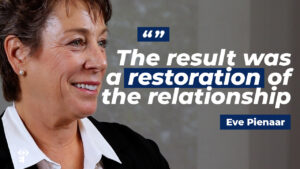Mediation: Fostering Emotive Solutions in Trusts, Wills, & Probate Cases
Mediator:
Eve Pienaar
Sector:
Trusts, wills, and probate
Outcome
Instead of focusing solely on legal arguments, the mediation process delved into the emotional needs and concerns underlying the claim. A mutually agreeable solution was reached, and a trust was established with a “reasonable pot of money” to support the estranged daughter’s future.
The Challenge
Disputes within trusts, wills, and probate cases are often fraught with emotional complexities. These cases can involve individuals who believe they deserve a portion of the estate, often due to overlooked familial ties, unclear wills, or perceived injustices. Often, there’s a significant power imbalance, where claimants facing financial hardship go up against well-resourced beneficiaries.
The Case
A case involving a third wife who inherited a significant sum from her deceased husband. The husband had previously maintained a relationship with his estranged children, a fact unbeknownst to the wife.
One of these children, a wealthy individual in a challenging life circumstance, filed a claim against the estate, supported by a Conditional Fee Agreement (CFA) – a legal arrangement linking lawyer’s fees to the outcome of the case. This, coupled with the “Part 36” offer system, further amplified the tension between the parties, hindering any direct communication.
Why mediation?
Recognising the emotional nature of the conflict and the impeding legal roadblocks, mediation was introduced. This facilitated a neutral space for open communication and understanding.
Shifting away from a purely legal focus, the mediation sought to understand the core emotional needs and concerns fuelling the claim. By facilitating discussions between the lawyers first, focusing on the merits of the claim and the possibility of reasonable provisions, the focus shifted from specific demands of a house and ongoing maintenance to a more sustainable solution.
Solution
This outcome not only addressed the practical need but also facilitated an unexpected positive consequence: the restoration of the family relationship, leading to the prospect of the grandmother seeing her grandchild.
Key Learnings
- Mediation provides a safe space for open communication and exploration of underlying emotional concerns, allowing for solutions beyond legal arguments.
- By addressing the emotional needs of all parties involved, mediation can foster empathy and lead to mutually agreeable, sustainable solutions.
Conclusion
Recognising the limitations of legal arguments alone, the mediator skilfully addressed the emotional nature of the dispute. This approach led to a resolution where both parties found common ground, culminating in a trust with substantial funds to support the estranged daughter’s future.
Watch Eve Pienaar Discuss the case here:



